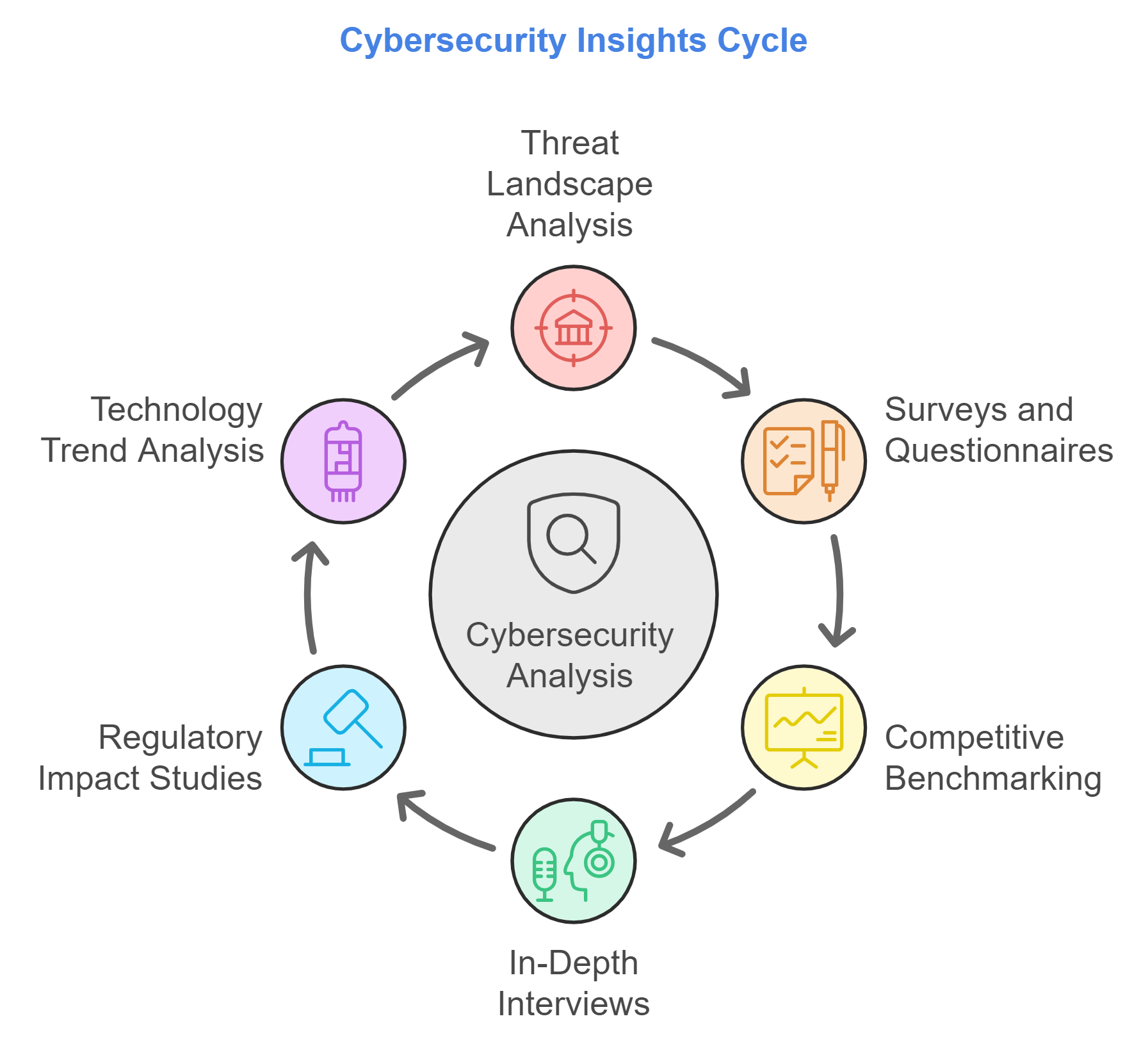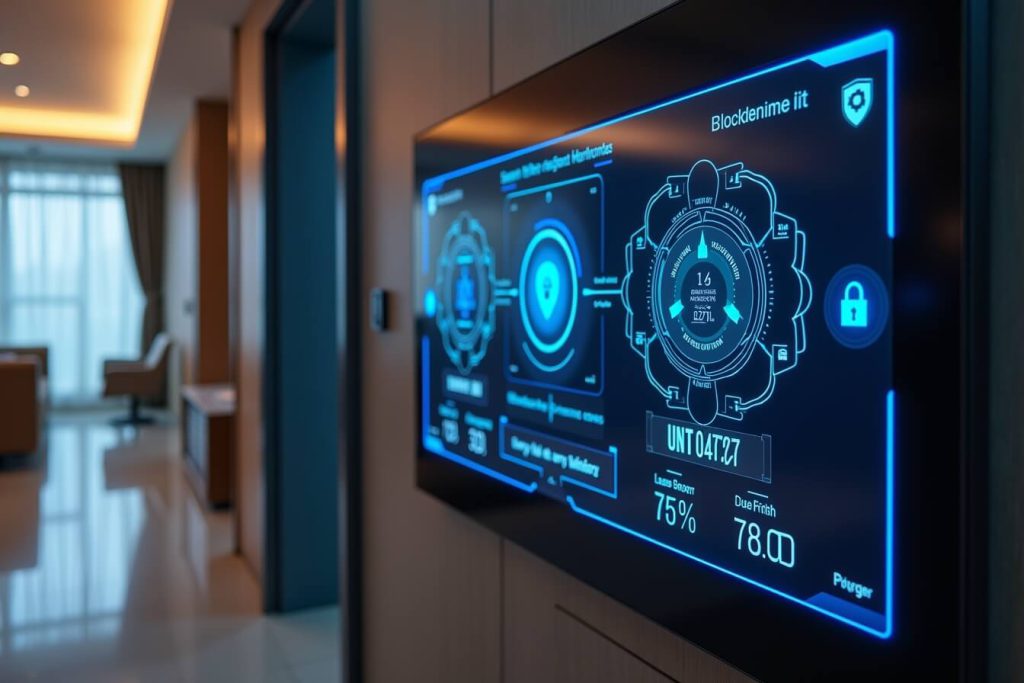Étude de marché sur la cybersécurité B2B

B2B cyber security market research provides businesses with the data and insights they need to navigate risks and implement the most effective solutions.
Every business knows the cost of a cyber attack—data loss, downtime, and damaged reputation. B2B cyber security market research offers a roadmap to prevention, guiding organizations to identify risks and implement the best defenses.
What Is B2B Cyber Security Market Research?
B2B cyber security market research aims to understand the evolving landscape of cyber threats, security solutions, and industry trends. Unlike general cyber security research, B2B cyber security market research addresses the unique complexities of business environments, including:
- Multi-layered IT infrastructures.
- Compliance with industry-specific regulations.
- The rise of remote work and cloud-based solutions.
Why Do Businesses Need B2B Cyber Security Market Research?

The rising frequency and sophistication of cyber threats have made robust security measures imperative for businesses. B2B cyber security market research provides the critical insights organizations need to safeguard their operations and maintain customer trust – and here are the main reasons why businesses rely on this research:
Addressing Escalating Threats
Cyber criminals continually evolve tactics, targeting businesses with ransomware, phishing, and advanced persistent threats. B2B cyber security market research helps organizations stay ahead by identifying:
- Emerging attack vectors.
- Industry-specific vulnerabilities.
- Evolving tactics used by cyber adversaries.
Optimizing Security Investments
Cyber security solutions often require significant investment, and businesses must allocate resources effectively. Market research enables organizations to:
- Identify the most critical areas of risk.
- Evaluate the cost-effectiveness of solutions like endpoint protection or SIEM platforms.
- Benchmark against industry standards to ensure competitive parity.
Naviguer dans la complexité réglementaire
Businesses across industries must comply with GDPR, HIPAA, and CCPA regulations governing data protection and privacy. B2B cyber security market research helps organizations understand:
- How regulatory changes impact their operations.
- The best practices for compliance in their sector.
- Emerging trends in data protection standards.
Enhancing Customer Trust and Retention
Strong cyber security practices are critical for maintaining client confidence. Market research helps businesses identify customer priorities and align their security strategies accordingly.
- What do clients expect in terms of data protection?
- How does a company’s security posture influence customer loyalty?
Techniques for Effective B2B Cyber Security Market Research
B2B cyber security market research combines qualitative and quantitative methods to provide actionable insights. Below are key techniques used to gather and analyze data:

- Threat Landscape Analysis: Identifying current and emerging cyber threats specific to industries or regions.
- Enquêtes et questionnaires : Engaging IT leaders, CISOs, and other decision-makers through surveys helps businesses gather insights into security challenges, spending priorities, and technology adoption rates.
- Analyse comparative concurrentielle : Assessing competitors’ cyber security measures provides benchmarks for evaluating an organization’s security posture.
- Entretiens approfondis : Conducting one-on-one interviews with industry experts, IT managers, and security consultants provides detailed qualitative insights into specific challenges and solutions.
- Regulatory Impact Studies: Analyzing the implications of data protection regulations on businesses helps organizations align their strategies with compliance requirements.
- Technology Trend Analysis: Monitoring advancements in cyber security tools such as AI-based threat detection, zero-trust architecture, and blockchain provides insights into emerging solutions.
Tendances en matière de cybersécurité B2B

One of the trends already coming into effect is the race for compliance as B2B companies scramble to comply with the General Data Protection Regulation (GDPR). Non-compliance can result in reputational damage and hefty fines. B2B executives are also struggling to keep pace as their customers demand more personalized, responsive, and faster tech-driven services.
Another trend will be increased priority given to cloud security. As companies increasingly depend on cloud storage, the cloud environment has become a potential target for cyber attacks. B2B companies are expected to develop data governance and security programs to counteract breaches on public clouds. Improved firewalls and secure web gateways will likely be integrated into this effort to beef up B2B cybersecurity.
Nouvelles technologies à déployer dans les efforts de cybersécurité B2B
B2B and other companies are expected to employ machine learning, which can process immense amounts of data and carry out large-scale tasks to detect and correct suspicious behavior, known weaknesses, and zero-day attacks. Conversely, cyber enemies are also expected to use machine learning to assist their attacks. They will seek to interrupt detection models, learn from protective responses, and manipulate newfound vulnerabilities quicker than defenders can patch them.
Les géants de la technologie Cisco, Apple, Allianz et Aon ont récemment annoncé qu'ils avaient uni leurs forces pour créer un nouveau service conçu pour permettre aux entreprises de gérer les cyber-risques. Un communiqué de presse des sociétés indique que la nouvelle solution comprend une technologie sécurisée d'Apple et de Cisco, un service d'évaluation d'Aon mesurant la cyber-résilience et des options de couverture de cyber-assurance d'Allianz.
AI-Powered Solutions for B2B Cybersecurity: WP Safe Zone
In the competitive B2B landscape, where sensitive business data and transactions are constantly at risk, cybersecurity is a top priority. Artificial intelligence is revolutionizing this space by offering smarter, more adaptive tools. One such innovation is the WP Safe Zone plugin, designed for WordPress security.
WP Safe Zone leverages AI to detect and block threats such as malware, brute force attacks, and unauthorized access in real-time. Its adaptive algorithms learn from attack patterns, ensuring robust and proactive protection for business websites.
For B2B companies seeking reliable cybersecurity solutions, WP Safe Zone showcases how AI can secure digital infrastructure and maintain trust in the digital marketplace.
Nouveaux problèmes de cybersécurité B2B

Research has revealed that only about a third of B2B companies know the GDPR above. About half of all organizations are unlikely to fully comply with GDPR requirements. Although the GDPR is a massive shakeup to how companies are required to handle their consumer data, the security threats it is trying to prevent are very real, and B2B companies would do well to take it seriously.
Outre le non-respect du RGPD, une nouvelle menace apparaît : le cyberespionnage. Un cinquième des entreprises ayant répondu à une enquête récente ont identifié le cyberespionnage comme leur préoccupation la plus urgente. Vingt pour cent des personnes interrogées aux États-Unis ont déclaré avoir été victimes d'une attaque de cyberespionnage au cours de l'année écoulée. L’enquête désigne également le phishing et les cyberattaques ciblées comme principales préoccupations des entreprises mondiales.
Opportunities in B2B Cyber Security Market Research
B2B cyber security market research enables organizations to strengthen their defenses, align with industry trends, and capitalize on emerging market needs. Here are five key opportunities for businesses to explore:
1. Adoption of AI and Machine Learning
Advanced AI and machine learning technologies are transforming cyber security. Market research helps businesses identify how these tools can be integrated into existing systems to enhance threat detection, automate responses, and reduce human error.
2. Focus on Small and Medium Enterprises (SMEs)
SMEs often lack the resources for comprehensive cyber security measures, making them a growing market for affordable and scalable solutions.
3. Emerging Markets Expansion
Cyber security becomes critical as digital infrastructure grows in Southeast Asia, Africa, and Latin America. Research identifies demand, regional threats, and compliance challenges, enabling businesses to enter these markets effectively.
4. Zero-Trust Security Implementation
Zero-trust architecture is gaining traction as businesses move to cloud-based operations and remote work.
5. Cybersecurity for IoT and Connected Devices
The rise of IoT devices in sectors like healthcare, manufacturing, and logistics has created vulnerabilities.
What Makes SIS International a Leader in B2B Cyber Security Market Research?

SIS International stands out as a trusted partner for businesses seeking to navigate the complexities of cyber security. Our team empowers organizations to make informed decisions and build robust defenses against cyber threats by offering tailored insights, advanced methodologies, and a client-centric approach.
Solutions de recherche sur mesure
SIS International customizes its research to address each client’s unique needs to help them understand emerging threats or evaluate new security technologies.
Une expertise mondiale avec des connaissances locales
With a presence in key global markets, SIS combines a global perspective with regional expertise. This dual approach ensures businesses can address local regulatory challenges and cultural nuances while maintaining a global security strategy.
Advanced Research Techniques
The firm leverages cutting-edge tools such as AI-driven analytics, behavioral modeling, and predictive insights to provide comprehensive and actionable findings.
Focus sur les tendances émergentes
SIS monitors the evolving threat landscape, helping clients avoid ransomware, supply chain attacks, and IoT vulnerabilities.
Industry-Specific Expertise
From financial services to healthcare, SIS has experience in diverse industries, offering insights tailored to each sector’s specific challenges and regulations.
Expérience prouvée
SIS International has collaborated with Fortune 500 companies and industry leaders, delivering impactful research that drives innovation and enhances security postures.
Notre emplacement à New York
11 E 22nd Street, étage 2, New York, NY 10010 Tél. : +1(212) 505-6805
À propos de SIS International
SIS International propose des recherches quantitatives, qualitatives et stratégiques. Nous fournissons des données, des outils, des stratégies, des rapports et des informations pour la prise de décision. Nous menons également des entretiens, des enquêtes, des groupes de discussion et d’autres méthodes et approches d’études de marché. Contactez nous pour votre prochain projet d'étude de marché.


